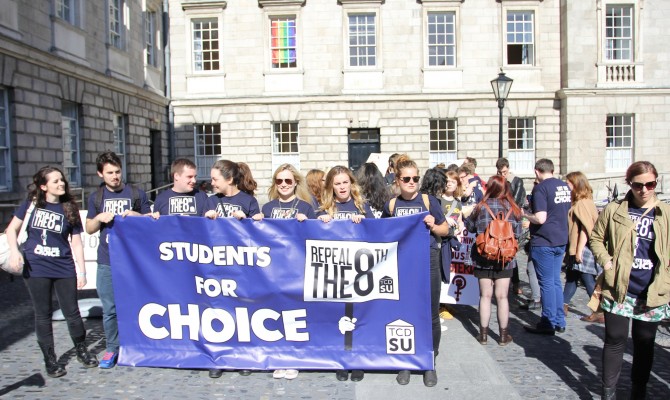
Taking part in this event, opened by Emma Dooney, who is heading DU Amnesty’s My Body, My Rights campaign, were four speakers, who each talked about the topic from a different perspective. They were Dr Marion Dyer of Trinity, Laura who provided a personal story of abortion, Philomena Canning of Midwives for Choice and Katie Dawson of Lawyers for Choice.
Laura said that nothing can be classified as “black or white” when it comes to the topic of abortion.
She explained that in her 21st week of pregnancy, a doctor told her that her baby would be affected by Down syndrome, with a high possibility of death as well due to an abnormality of her amniotic fluid. After the decision to go to UK to end her pregnancy, she recounted how she had to face the consequences of this decision alone, with almost no medical support from the Irish health care system. After the abortion, she had some complications, and she described not only the physical suffering but also the psychological damage caused by the stress of facing this process alone.
She ended her story by asking for the repeal of the Eighth Amendment to give all women the right to decide.
After Laura’s story, Dr Dyer performed a role play, in which she simulated a sample of a consultation about abortion in a medical office. She explained how much relevant information can be given to a patient in only ten minutes of talk.
Afterward, she stressed the importance of adequately training young medical students, so that they are prepared for the possible situation of treating a woman who wants to terminate a pregnancy.
Philomena Canning, from Midwives for choice, talked about the work of her organisation, which is dedicated to advancing respectful maternity care as a universal human right due to every pregnant woman in Ireland.
She explained that they believe that respect for the choices that a woman makes, her preferences and priorities, beliefs and values, and her perception of what it means for her to thrive as a human being, is central to protecting her right to autonomy and self-determination.
Finally, Katie Dawson of Lawyers for Choice spoke. She discussed the theory according to which the Eighth Amendment was approved and said that the amendment should be removed from the constitution.
The legislation that replaces it, she said, must be provide the same rights that normal patients have to pregnant women seeking abortions.
The Eighth Amendment to the Irish Constitution was adopted in 1980. At that time, the amendment was approved by a referendum passed by a vast majority. It was then attenuated in 1992 when women were granted the right to go abroad to have an abortion. The Protection of Life During Pregnancy Act was established in 2013 for women whose lives are endangered by pregnancy, allowing women access to abortions in such circumstances, including when there is a risk of suicide.






